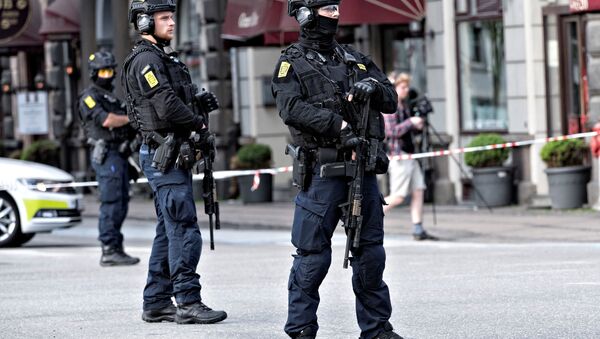A total of 160 soldiers bearing automatic weapons and special insignia have been assisting the Danish police in Copenhagen, as well as the border controls in the south of the country since mid-autumn 2017.
The Danish government has justified the much-debated deployment as a bid to relieve the state police suffering from huge amounts of overtime and a neglect of other crime, particularly related to mob wars that plagued the Danish capital in 2017. Furthermore, the sites placed under special protection include the Israeli embassy and the Great Synagogue in Copenhagen, which was the scene of a fatal terrorist shooting in 2015.
With parts of the capital cordoned off, locals have started complaining that their city is starting to resemble a war zone, coupled with spot-checks and body searches and plans to introduce a curfew for minors voiced by the Danish People's Party.
Dea Wallin, a shop assistant working next to the synagogue, contended that the soldier's presence has had a negative impact on people's peace of mind.
"I think it is a pretty scary thing to see soldiers walking on the street carrying guns," Wallin told the Copenhagen Post. "It looks really rough and dramatic and we're not used to that type of stuff in Denmark," she added, questioning the idea that the soldiers' presence will make a difference. "The thing about terrorism is if it happens, it happens — you can't really do anything to protect us unless you have the police keeping an eye on a dude buying explosives online," she added.
"We have crossed a very big threshold and we have to be aware of that. Once their presence becomes normalized, what's next? How far are you willing to squeeze our human rights to gain some collective security and short-term gains?" Kjærgaard ventured.
According to Kjærgaard, the presence of soldiers normalized the idea of living in a martial state, eroded the right to privacy and was fundamentally un-Danish as it amounted to "re-interpreting the basic rules of a democracy." The Danish people are not used to having armed soldiers in the streets, he argued.
READ ALSO: Mean Streets: Denmark Cooks Up Ban to Prevent Takeover by Multiethnic Mobs
Furthermore, Kjærgaard suggested that since the police and the military had distinct roles and underwent various training, merging the two was dangerous as it perpetuated a "monopoly of violence," as soldiers, unlike policemen, are trained to use deadly force as a first-resort option. Police officers, on the other hand, shoot to stop, not to kill, he explained.
"Soldiers are not bad boys," Kjærgaard conceded. "But their deployment on Copenhagen's streets is actively overriding a fundamental pillar of democracy."
Soldater fra @forsvaretdk blev i dag indsat for at støtte politiet med bevogtning af mulige terrormål.https://t.co/GxW1Cly1dN#dkforsvar pic.twitter.com/Rupy4KVWla
— Forsvaret (@forsvaretdk) 29 септември 2017 г.
Lastly, Kjærgaard question the efficiency of a military presence in the prevention of terrorism.
"I am not safer just because some places are safeguarded. I am not safer just because I see a few more guns on the street," Kjærgaard said, stressing the random and indiscriminate nature of terrorism. "Making the synagogue a safer place does not make me safer," he added, emphasizing the importance of systematic intelligence.
Counterterrorism expert Martin Rasmussen agreed that while it certainly had some short-term benefits relieving the pressure from the police, it bore no long-term benefits.





